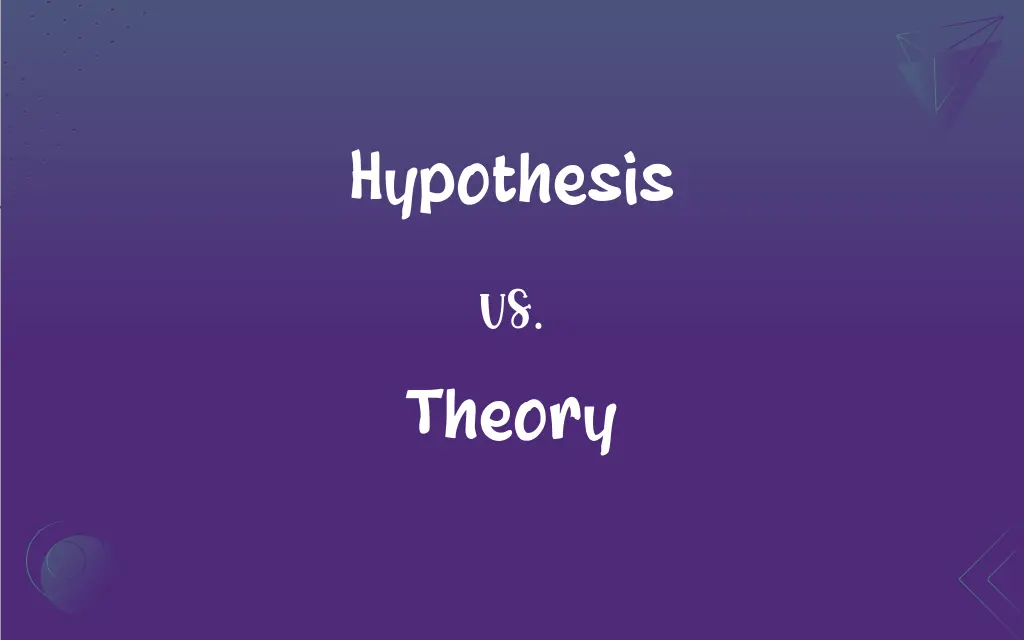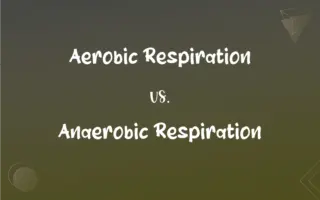Hypothesis vs. Theory: What's the Difference?
Edited by Janet White || By Harlon Moss || Updated on October 12, 2023
A hypothesis is a testable, tentative explanation or prediction, while a theory is a substantiated explanation for phenomena, backed by a body of evidence.

Key Differences
A hypothesis is often derived at the nascent stage of scientific research. This statement or set of statements predicts the outcome of research or an experiment based on the existing knowledge. On the other hand, a theory, within the realm of science, represents a principle that explains a phenomenon, constructed on the foundation of substantiated empirical evidence and repeated testing. Both hypothesis and theory serve crucial, albeit different, functions in scientific explorations.
Examining a hypothesis, it is pivotal to emphasize that it must be testable and falsifiable. This means that through experimental design and data collection, a hypothesis can potentially be proven false. A theory, conversely, has already undergone this rigorous testing and validation process and is widely accepted within the scientific community. Each serves a distinct role; hypotheses pose questions or suggest relationships, while theories provide accepted explanations.
A hypothesis is formed before the conduction of scientific research. It proposes a possible explanation or prediction based on what is already known, awaiting validation through testing. In contrast, a theory has navigated through the tides of scrutiny, evaluation, and validation, emerging as an explanation of a phenomenon or a relationship among several, fortified by a substantial body of evidence, and is accepted as such until new evidence potentially disrupts it.
It's imperative to note that while a hypothesis can develop into a theory if consistently validated through rigorous testing and research, they remain distinct concepts in scientific methodology. A hypothesis always projects a forward-looking investigative stance, providing a trajectory for research. Simultaneously, a theory maintains a position of an established explanatory model, having already undergone the crucible of scientific examination and emerged validated.
In casual conversation, the words hypothesis and theory might be used interchangeably, but in scientific contexts, they have specific and distinct meanings. The hypothesis embarks on the investigative journey, presenting what might be, acting as a speculative leap toward new knowledge. The theory, however, stands firm on a mountain of accumulated knowledge, offering explanatory frameworks that assist in understanding and predicting related phenomena, having weathered the systematic exploration and testing of the scientific method.
ADVERTISEMENT
Comparison Chart
Basic Definition
A tentative explanation or prediction.
A substantiated explanation backed by evidence.
Stage in Research
Usually at the beginning.
Develops after extensive testing and validation.
Validation
Awaiting testing and validation.
Has been validated by a substantial body of evidence.
Falsifiability
Must be testable and falsifiable.
Has been tested and not falsified.
Function in Scientific Method
Poses possible explanations and predicts outcomes.
Explains phenomena and offers frameworks for understanding
ADVERTISEMENT
Hypothesis and Theory Definitions
Hypothesis
A hypothesis is grounded in existing knowledge but projects a tentative new explorative step or relationship.
The scientist's hypothesis predicted a direct relationship between sugar consumption and hyperactivity in children.
Theory
A theory is a substantiated explanation of phenomena, grounded in a comprehensive analysis and rigorous testing.
Darwin's theory of evolution explains the diversified development of life forms through natural selection.
Hypothesis
A hypothesis is a proposed, testable prediction or explanation awaiting scientific evaluation.
Her hypothesis suggested that increased sunlight would enhance the plants' growth rate.
Theory
A theory is a principle set forth to explain a class of phenomena or facts, continuously substantiated by experimentation and observation.
The atomic theory describes the matter as composed of discrete units called atoms.
Hypothesis
A hypothesis must be falsifiable, meaning it must be structured in a way that allows it to be proven incorrect.
The researcher’s hypothesis, that exercise impacts memory, was constructed to be tested and potentially falsified.
Theory
A theory synthesizes a body of information to explain or predict future occurrences and is adaptable in the light of new evidence or facts.
Quantum theory has revolutionized our understanding of the microscopic world, explaining phenomena at the atomic and subatomic level.
Hypothesis
A hypothesis often precedes experimentation, providing a guide or direction for the research methodology.
The study’s hypothesis, that antioxidants reduce aging signs, determined the experimental design and variable selection.
Theory
A theory provides a framework to understand patterns, making predictions about future occurrences based on established facts.
Einstein's theory of relativity altered our understanding of space, time, and gravity.
Hypothesis
A hypothesis may evolve into a theory if consistently validated across varied testing and contexts.
His hypothesis, asserting a material's specific heat impacts its thermal conductivity, paved the way for further research, aspiring to develop into a theory.
Theory
A theory, in scientific contexts, represents an established and repeatedly validated model explaining known facts or phenomena.
The germ theory of disease introduced a paradigm where microorganisms are the cause of various diseases.
Hypothesis
A tentative explanation for an observation, phenomenon, or scientific problem that can be tested by further investigation.
Theory
A set of statements or principles devised to explain a group of facts or phenomena, especially one that has been repeatedly tested or is widely accepted and can be used to make predictions about natural phenomena.
Hypothesis
Something taken to be true for the purpose of argument or investigation; an assumption.
Theory
The branch of a science or art consisting of its explanatory statements, accepted principles, and methods of analysis, as opposed to practice
A fine musician who had never studied theory.
FAQs
Is a hypothesis a question?
A hypothesis is more than a question; it is a testable statement predicting outcomes based on assumed facts.
What defines a theory?
A theory is a substantiated explanation or model, backed by a robust body of evidence, explaining certain phenomena.
Can a hypothesis turn into a theory?
Yes, if a hypothesis is repeatedly tested and validated through extensive research, it may develop into a theory.
What is a hypothesis?
A hypothesis is a testable, tentative prediction or explanation about a phenomenon or relationship between variables.
Is every hypothesis tested?
Ideally, yes, but practical constraints like resources might limit the testing of all hypotheses.
Can a hypothesis be proven true?
A hypothesis can be supported, but scientific methodology does not absolutely prove it to be true indefinitely.
Is a theory absolute or can it change?
A theory can change or be refined when new evidence emerges, adapting to incorporate new data.
Can a hypothesis be broad and general?
Hypotheses should ideally be concise and specific to ensure accurate testing and validation.
How does a theory differ in scientific vs. casual contexts?
Scientifically, a theory is a robust explanatory model, while casually, it may simply imply a speculative idea.
Is a theory widely accepted by scientists?
Generally, a theory is widely accepted within the scientific community, having undergone rigorous validation.
Can anyone propose a theory?
While anyone can propose a theory, it must undergo rigorous scientific testing and validation to be accepted.
Can a hypothesis predict outcomes?
Yes, hypotheses often predict potential outcomes of research or expected patterns in data.
Can theories predict future occurrences?
Yes, theories often allow scientists to make predictions about future events or findings.
What makes a hypothesis valid?
A hypothesis is valid if it is testable, falsifiable, and grounded in existing knowledge.
What is a null hypothesis?
A null hypothesis posits no effect or relationship and serves as a default position until tested.
Is a theory always based on facts?
Yes, theories are grounded in and built upon facts that have been repeatedly validated.
Is a hypothesis always derived from a theory?
Not always; a hypothesis can stem from a theory, observations, or previous research findings.
Can a theory ever be disproven?
Yes, if new evidence that contradicts a theory emerges, it may be disproven or require modification.
Can a theory be tested?
Yes, theories can and should be tested and refined to ensure alignment with new evidence and findings.
Why is a theory important?
Theories provide robust frameworks for understanding phenomena, guiding future research, and applying knowledge practically.
About Author
Written by
Harlon MossHarlon is a seasoned quality moderator and accomplished content writer for Difference Wiki. An alumnus of the prestigious University of California, he earned his degree in Computer Science. Leveraging his academic background, Harlon brings a meticulous and informed perspective to his work, ensuring content accuracy and excellence.
Edited by
Janet WhiteJanet White has been an esteemed writer and blogger for Difference Wiki. Holding a Master's degree in Science and Medical Journalism from the prestigious Boston University, she has consistently demonstrated her expertise and passion for her field. When she's not immersed in her work, Janet relishes her time exercising, delving into a good book, and cherishing moments with friends and family.
































































